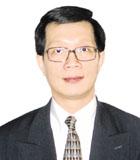![]()
Gear Up | Winning Words
Broaden Your Network | Learners' Light | Enrich Your Readings
On Education
On Education - Interviews with professors and department heads cover the hottest courses available at the eight higher education institutions and the resulting career opportunities.
|
Training for an engineered world
by Edward Chung
The modern business world requires well-rounded engineers who are able to apply their knowledge to any situation. Therefore, management skills are becoming more important than ever, and the Chinese University of Hong Kong (CUHK) makes sure that budding engineers get a good training in it. "The broad-based curriculum that we have adopted at CUHK offers the chance for students to grasp life at work. Our mission is to nurture future leaders in engineering who are not only technically competent, but also have the vision, knowledge and exposure to excel at the top," says Dr Ching Pak-chung, dean of the CUHK's Faculty of Engineering. Under the modular system followed at CUHK, engineering undergraduates take up to a quarter of their degree in non-engineering courses. The current degree requires 99 units to be completed, with compulsory units comprising about 70 to 75 percent of the mix. The remainder is occupied by electives, which include general education, languages and other related topics. Despite this, purists need not be concerned about the dilution of engineering education. "We require our undergraduates to take a few management modules as part of their degree," explains Dr Ching. "We actually have a specialised department for engineering management, because we feel that, although technical knowledge is the most important aspect of their education, engineers simply cannot afford to ignore business issues. This way, we also prepare students so that they have at least a general idea of what the industry needs when they join the workforce." He adds that there are no barriers to reaching management grade for engineering graduates, provided that they have the necessary qualities. "It relies on personal calibre - and management skills tend to be transferable," he says. "If you can manage people, you can manage a business or an engineering project. Indeed, a significant number of engineering graduates have become managers." Career choice An engineering education, while specialised, also provides a good grounding for other careers, says Dr Ching. "Engineering students are good at problem solving and analysis. This is necessary for the subject and also useful in many other areas, making engineering graduates good choices for unrelated industries." "For example, although the economy is not doing so well, we've found that financial and insurance companies like to hire engineering graduates because of their analytical mindset. They are particularly good at finding problems with current working models and proposing solutions and new products." Women on tech Engineering is also no longer exclusively a man's world. The number of female students has steadily increased and Dr Ching attributes this to the fact that more young women are finding engineering to be an acceptable career choice. "These days, it is not a physically demanding job either - you are unlikely to find yourself shifting heavy machinery or covered in grime on the shop floor," he comments. "Also, CUHK's engineering department concentrates on IT and the computer science aspects of engineering which are a bit more cerebral; perhaps this has had an impact on the number of female applicants." Currently, within the Faculty of Engineering, about 30 percent of the students in the field of information technology are female, with between 10 and 20 percent studying robotics-related subjects. "The trend is slowly moving towards balance, although I don't know when that might happen," says Dr Ching. "We want more female students, but don't want to set any targets. We'll probably reach a 60:40 ratio, which is helped by the fact that increasing numbers of our lecturers are also women."
Taken from Career Times 2003/06/13 |
|||||||
(11-20 of 68)
A booming market
(2003/07/25)
A leader or a follower...
(2003/07/11)
A classical education
(2003/06/27)
Training for an engineered world
(2003/06/13)
In the market for professionalism
(2003/05/30)
A broader outlook on business
(2003/05/16)
Building a career from the ground up
(2003/04/11)
No ordinary language school
(2003/04/04)
The business of learning
(2003/03/28)
Using geography to understand the world
(2003/03/14)
(11-20 of 68)


